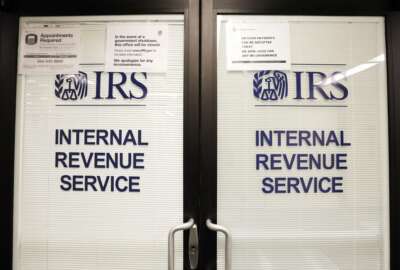

The IRS moved and the Treasury Department rushed to get millions of payments out to the public in the week and months after Congress passed the CARES Act, but in...
The IRS and Treasury Department rushed to get millions of payments out to the public in the weeks after Congress passed the CARES Act, but in doing so sent more than a million payments to people who have died.
The Government Accountability Office, in a wide-ranging report of agencies’ response and recovery efforts during the coronavirus pandemic, found neither the IRS nor the Treasury used death data from the Social Security Administration for the first three waves of pandemic payments “because of the legal interpretation under which IRS was operating.”
Without that check in place, the Treasury Inspector General for Tax Administration told GAO the IRS has sent out more than a million payments to the deceased worth $1.4 billion since the end of April.
GAO says these findings underscore the “importance of consistently using safeguards” when providing government assistance to taxpayers. The IRS relies on third-party death data from SSA’s Death Master File to flag tax returns for possible fraud, but Treasury and its Bureau of the Fiscal Service do not have access.
GAO recommends Congress pass legislation updating the Social Security Act to give Treasury full access to the Death Master File.
“Both Treasury and IRS having full access to death data will help ensure the integrity of direct payments to individuals if Congress considers this type of assistance in the future,” GAO wrote.
Last year, Sens. Tom Carper (D-Del.) and John Kennedy (R-La.) joined Reps. Cheri Bustos (D-Ill.) and Greg Gianforte (R-Mont.) in introducing the Stopping Improper Payments to Deceased People Act, which would grant federal agencies access to the full set of the Social Security Administration death records, including state-reported death data.
The Social Security Advisory Board has also reiterated its recommendation to Congress to shift the responsibility of federal death data collection from SSA to Treasury’s Do Not Pay portal to help stop payments to the deceased.
Two weeks after Congress passed the CARES Act, the Treasury Department and its Bureau of the Fiscal Service disbursed more than 81 million payments worth $147 billion through direct deposit.
But before Congress even passed the massive pandemic spending bill, the working group tasked with administering the pandemic payments raised questions to the Treasury Department about how to avoid payments to the deceased.
However, the IRS’ legal counsel “determined that IRS did not have the legal authority to deny payments to those who filed a return for 2019, even if they were deceased at the time of payment,” GAO wrote in its report.
IRS legal counsel also told agency officials to apply the same set of processing rules on recipients who filed a 2018 tax return but not a return for this year. Because of this determination, “IRS officials said on the basis of this determination they did not exclude decedents in their programming requirements,” GAO wrote.
In addition to pulling from 2018 and 2019 tax filing information, the CARES Act allowed the IRS to access 2019 Social Security and Railroad Retirement benefit statements.
Working under the CARES Act mandate to deliver payments “as rapidly as possible,” Treasury officials told GAO they followed much of the same playbook as the agency did in 2008 when sending out payments to a wide swath of the public.
But GAO had found issues with that process in a 2013 report, which led to the IRS putting a process in place to use death records to update taxpayer accounts to identify and prevent improper payments.
“Bypassing this control for the economic impact payments, which has been in place for the past 7 years, substantially increased the risk of potentially making improper payments to decedents,” GAO wrote.
A Treasury official from the Office of Tax Policy told GAO the agency was unaware the payments may have gone to the deceased. But the agency now considers payments improper if the recipient died before the payment date.
On May 6, the IRS posted on its website that payments sent to deceased or incarcerated people should be returned. However, the IRS does not currently plan to take additional steps to notify ineligible recipients on how to return payments.
GAO said the IRS should consider cost-effective ways to let ineligible payment recipients know how to return payments. The IRS, for example, has sent letters to households within two weeks of the start of pandemic payments letting households know how to report a missing payment.
GAO suggested the IRS could consider sending a similar letter to ineligible recipients, letting them know how to return the payments.
The Washington Post first reported this story Thursday.
Copyright © 2025 Federal News Network. All rights reserved. This website is not intended for users located within the European Economic Area.
Jory Heckman is a reporter at Federal News Network covering U.S. Postal Service, IRS, big data and technology issues.
Follow @jheckmanWFED



